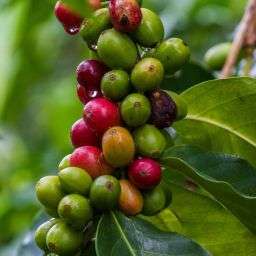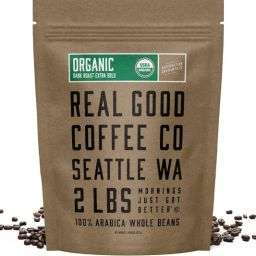
Organic coffee production in Guatemala is a testament to the country’s commitment to environmentally friendly and sustainable farming practices. This Central American nation is blessed with volcanic soil, ample rainfall, and high altitudes, providing the perfect conditions for growing coffee organically. These geographic and climatic advantages ensure that coffee plants thrive, producing beans that are not only rich in flavor but also grown without the use of synthetic fertilizers or pesticides.
Key Takeaways
- Rich Flavor Profiles: Organic Guatemalan coffee is renowned for its diverse flavor profiles. Coffee enthusiasts can expect a spectrum of tastes, from the bright citrus and deep chocolate notes typical of the Antigua region to the floral and nutty undertones found in beans from Atitlán. These complex flavors are a direct result of the organic farming methods and the country’s varied microclimates.
- Enhanced Quality through Traditional Methods: The traditional farming practices of shade-growing, hand-harvesting, and sun-drying play a crucial role in the quality of organic Guatemalan coffee. Shade-grown coffee benefits from a slower maturation process, enhancing the beans’ natural sweetness. Hand-harvesting ensures that only the ripest cherries are picked, while sun-drying preserves the bean’s inherent flavors.
- Environmental and Social Benefits: Organic farming in Guatemala is not just about producing high-quality coffee; it’s also about protecting the environment and supporting local communities. These practices reduce the chemical load on the land and promote biodiversity. Moreover, certifications like Fair Trade and Rainforest Alliance highlight the industry’s efforts towards ethical labor practices and environmental conservation, ensuring that consumers are part of a sustainable and socially responsible coffee supply chain.
Regions Producing Organic Guatemalan Coffee
Guatemala, a country celebrated for its premium coffee, boasts several regions each offering unique flavor profiles due to their distinct geographical and climatic conditions. Organic coffee from these regions reflects the rich biodiversity and traditional farming practices of Guatemala.
- Antigua is renowned for its coffee, benefiting from the fertile volcanic soil and moderate climate. Coffees from Antigua are known for their full body, rich flavor, and a balanced acidity, often with chocolate, citrus, and sometimes spicy flavors.
- Atitlán, surrounded by volcanoes and Lake Atitlán, has coffee plants nourished by mineral-rich volcanic soil. The coffee from this region is characterized by its floral aromas, bright acidity, and flavors of fruit and chocolate. Organic practices in Atitlán focus on preserving the natural environment and ensuring the coffee’s distinct taste.
- Huehuetenango, located in the highlands, is another prime coffee-growing region. Due to its high elevation and unique microclimate, it produces coffee with a sweet acidity and complex flavors, including notes of chocolate, fruit, and caramel. Organic farmers in Huehuetenango employ traditional methods to enhance soil health and bean quality.
Each of these regions contributes to the diversity and richness of Guatemalan coffee, with organic farming practices ensuring the preservation of natural flavors and environmental health.
The Process from Bean to Cup
The journey of organic Guatemalan coffee from bean to cup is a meticulous process that highlights the dedication to quality and sustainability at every step.
Cultivation: Organic coffee cultivation in Guatemala starts with the selection of high-quality Arabica beans, grown in shaded areas that mimic the natural forest canopy. This method promotes biodiversity and soil health, crucial for organic farming.
Harvesting: Hand-picking is the next critical step, where farmers carefully select only the ripe cherries, ensuring the highest quality. This labor-intensive process reflects the commitment to producing premium organic coffee.
Processing: After harvesting, the beans are processed using the wet method, where the fruit is removed from the beans before they are dried. This method is favored for its ability to preserve the beans’ inherent flavors. Organic practices during processing include using natural fermentation and minimizing water usage.
Drying and Roasting: Sun-drying is a traditional method used by Guatemalan farmers, aligning with organic standards by avoiding artificial heat sources. This natural process ensures the coffee retains its unique flavor profile. Roasting is then tailored to highlight the distinct characteristics of each region’s beans, ranging from light to dark roasts.
Brewing: Finally, brewing organic Guatemalan coffee is about extracting its exquisite flavors. Techniques vary, but methods like pour-over and French press are popular for their ability to showcase the coffee’s rich and complex taste profile.
Flavor Profiles and Brewing Tips for Organic Guatemalan Coffee
Organic Guatemalan coffee is celebrated for its intricate flavor profiles that captivate the palate of coffee aficionados worldwide. The rich volcanic soil and favorable climate of Guatemala’s coffee-growing regions contribute to producing beans with distinctive taste notes such as lemon, praline, toffee, cocoa, and citrus. These flavors reflect the natural environment in which the coffee is grown, making each cup a unique experience.
Brewing Tips to Enhance Flavor
To fully appreciate the complex flavors of organic Guatemalan coffee, consider the following brewing methods:
French Press: Ideal for extracting deep, rich flavors, the French press method allows the coffee’s natural oils and fine particles to remain in the brew, enhancing its body and taste. Use coarse-ground beans and steep for about four minutes for optimal flavor.
Pour-Over: This method is perfect for highlighting the brighter, acidic notes of Guatemalan coffee. A medium grind works best. Pour hot water (not boiling) in a slow, circular motion over the grounds to ensure even extraction. The pour-over technique accentuates the coffee’s nuanced flavors, such as citrus and floral notes.
Cold Brew: Cold brewing is an excellent way to bring out the coffee’s sweet and smooth qualities, minimizing acidity. Coarse grounds mixed with cold water are left to steep overnight (12-24 hours). This method produces a concentrate that can be diluted with water or milk, offering a refreshing take on Guatemalan coffee, particularly during warmer months.
Sustainability and Ethical Considerations
Sustainability and ethical practices are at the heart of the organic Guatemalan coffee industry. The move towards organic cultivation is not just about producing high-quality coffee; it’s also about ensuring the well-being of the environment and the communities involved in its production.
Sustainable sourcing practices help preserve biodiversity, minimize water usage, and reduce the chemical load on the land. These efforts are crucial in maintaining the health of ecosystems that support coffee farming.
Ethical considerations are equally important. Certifications like Fair Trade and Rainforest Alliance are indicators of a commitment to fair labor practices and environmental stewardship. They ensure that farmers receive a fair price for their coffee, promoting economic sustainability and improving living conditions. By choosing organic Guatemalan coffee that adheres to these standards, consumers support a model of production that respects both people and the planet.
FAQs
What are the best brewing methods for organic Guatemalan coffee? For capturing the essence of organic Guatemalan coffee, the French press, pour-over, and cold brew methods are highly recommended. These methods accentuate the coffee’s rich flavor profiles, from vibrant citrus to deep chocolate notes.
Why is altitude important for coffee quality? Altitude plays a critical role in coffee quality, with higher elevations providing cooler temperatures and more consistent rainfall. This environment allows coffee cherries to mature slowly, resulting in denser beans that offer complex flavors and aromas characteristic of organic Guatemalan coffee.
How can I identify authentic organic Guatemalan coffee? Look for certifications such as USDA Organic, Fair Trade, or Rainforest Alliance on the packaging. These labels ensure the coffee meets strict organic farming standards and supports ethical practices throughout the production process.
Final Thoughts
Organic Guatemalan coffee stands out for its exceptional quality, unique flavor profiles, and the sustainable and ethical practices behind its production. From the high-altitude farms to your cup, each sip offers a taste of Guatemala’s rich coffee heritage and the commitment of its farmers to preserve the environment and support their communities.
Whether you’re an enthusiast or a casual drinker, exploring the diverse flavors of organic Guatemalan coffee not only delights the palate but also contributes to a more sustainable and equitable world. Embrace the opportunity to enjoy and support the remarkable journey of organic Guatemalan coffee.









